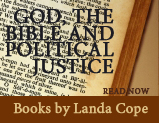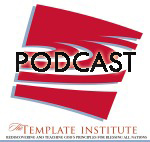Plantilla del Antiguo Testamento: Capítulo 19
We Need a Godly Perspective on Change
“You know how to interpret the appearance of the sky, but you cannot interpret the signs of the times.”
Mateo 16:3
“Men of Issachar, who understood the times and knew what Israel should do…”
1 Crónicas 12:32
If we are going to have influence in the nations, like the men of Issachar, we must be people who know the signs of our times.
As we talked about in chapter eight, until the 1500’s the earth was definitely flat, according to the experts. Explorers and navigators held the view that sailing to the edges of the world meant certain death. Falling over the edge of livable surface meant slipping into the “other world” of demons and dragons. Maps of the era are suitably frightening. Had this dogma gone unquestioned, Columbus would have stayed home.
The “flat earth” hypothesis was not only the scientific view of the planet, but the theological view of the day as well. A flat earth was central to the doctrinal view of heaven and hell. The church held that man was the center of God’s universe; heaven was up and hell was down. The application of this truth was the conclusion that the earth must be flat. In the absence of more information, everyone agreed. The first scientists who challenged this idea where brutally treated, some executed by the church. They were not only viewed as wrong scientifically, but were deemed heretical for challenging God’s Word and authority.
En este caso, sin embargo, the church and the traditional Christian view of the day were wrong and the scientists were right. The earth is not flat, but more spherical and as we discovered more about the universe, rotating planets, and gravity, up and down became more figurative language than concrete in our perceptions.
What of heaven and hell then? Man’s centrality to God’s creation? Was God’s Word in danger of being discredited, even disproved, by science and research? In the 1540’s they were afraid that might be the case. But it was not. Only man’s understanding of what God meant in His Word has changed. Man is the center of God’s creation, but not necessarily geographically. Heaven and Hell are both clearly revealed truths, but their exact location is still a mystery.
The God who created all, sees all, knows all infinitely, is not shaken when our limited understanding goes through a learning curve. His supreme desire is that we ever grow to be more like Him. As the old hymn declares, “He is changing me,” and our view of His creation. God is not in conflict with truth, with facts, or any reality of the seen or unseen world, and He is not afraid of change.
Everything Is Changing!
In our age, it seems everything is changing constantly. After the year 2000, it is estimated that the average person will change professions four to five times in his/her working lifetime. Engineers today find that half their professional knowledge is obsolete every five years. Graduates today have been exposed to more information in one year than their grandparents were in a lifetime. Ninety percent of the information and knowledge required in the next five years has yet to be invented. Mind boggling, No es? To us perhaps, but not to God.
God is not experiencing a knowledge surge. He has had all this in His grasp from the beginning. We have nothing to fear from information and knowledge, old or new. For the facts can only reveal God, His nature and His ways.1 Pero, as finite human beings, we do fear change and always have.
Fear Not!
Imagine yourself as an Israelite in Moses’ day. Your people have lived in Egypt for 430 año. Para 400 año, you have been slaves to the pharaohs. In the last few months you have left Egypt and all that is known to you and your people. You are in the middle of a desert; you have no known source of food and water; you cannot go back to Egypt; you have no idea what is ahead in this unseen Promised Land. You are experiencing a paradigm change of all you know and God must remind you time and time again, “Fear not,” for He is with you.
Hoy, we experience that kind of shaking change, again and again, in one lifetime. In a world daily attuned by microchips, global economics, Hubble telescopes and instant information, our sense of reality can get shaky. When our reality begins to unravel we get insecure and, often, insecurity results in rigidity and a desire to control. When we shut down and refuse to understand the changes in our world, we stop growing. The fruit of all this fear is that we miss God’s expanding revelation of Himself through the universe He created.
Esther came to understand that God had a plan for her nation in the crisis in her life. She realized that her Uncle Mordecai’s words were true, “Who knows but that you have come to the royal position for such a time as this?"2 The pressures and changes of her day were purposeful for the Kingdom of God. She was afraid, but she turned to God in her fear and saw change work for His glory in her people.
In this day of global upheaval and what feels like disaster and doom, we need an Uncle Mordecai to tell us that our times are purposeful. Para, if God tarries and the end of the world is not at hand, we may live in a century of the greatest influence on the world for God’s Kingdom in the history of the human race. Let’s get God’s perspective on our times.
Global Social Revolution
One simple way of looking at the evolution of human societies and cultures is to see it in three primary cycles: the tribal or feudal system, the great city-states, and our more modern concept of nations.
The Feudal System
Virtually all of human society was, at one time, organized around something resembling a tribe. Whether the leaders were patriarchs, chiefs, or landlords, communities were organized and defined around the availability and ownership of land. In Europe, this was called the feudal system. The head of this socio/economic system was the landlord. The landlord owned the land and the peasants worked it. The landlord provided any education, healthcare, or law. In practice, a farm or a farm based village defined citizenship and community. Itinerant priests traveled from farm to farm. The landlord recruited, trained, y equipado del ejército. Los primeros monarcas europeos dependían del apoyo benevolente de esta terratenientes’ ejércitos. Durante un siglo u otro, prácticamente todas las regiones del mundo se organizó en estas entidades tribales. Muchas personas en África y los países de Oriente Medio siguen siendo tribales bajo la apariencia de las estructuras sociales más modernas. Esta edad "tribal" es la edad de Abraham a través de la época de los Jueces de Israel en las Escrituras. Hasta que el rey Saúl, Israel era un consorcio de 12 pueblos tribales vagamente conectados en red a través de la dirección de un juez.
Los Estados de la gran ciudad
La evolución cultural en la población impulsada siguió su curso y, de una manera u otra, comunidades de la tierra se transformaron. El próximo período de la estructura social se caracteriza por el desarrollo de las grandes ciudades-estado como Roma, Atenas, Alexandria, Constantinople, Babilonia, Hamburg, Paris. These cosmopolitan centers became the way we defined nation. One was a citizen of Rome. Rome built the roads, was the seat of education, controlled the economy. Taxes were paid to and collected by Rome. This is the world of Paul’s day. Paul held citizenship in Rome and in Jerusalem, dual citizenship he found useful in his work for the Kingdom. Had we lived in this era, our world-view would have us define nations as city/states.
Populations continued to grow and finally outgrew the political/economic infrastructure of city/states. Rome and systems like it became incapable of meeting the needs of their constituents and outgrew their ability to be governed and organized in this way. The world order of nations began to turn itself over once again. Hoy, none of us have our citizenship in a city/state or even really comprehend a world organized in this way.
Modern Nations
Today we speak of Italy, with a capitol in Rome, of Greece with a city called Athens. We understand that Hamburg is in Germany and Constantinople in Turkey, Alexandria in Egypt and Paris in France. Geopolitical borders have been created, modified, and changed again and again to form the world we understand in our time.
If you and I were asked where we are from internationally we would name our nation. Even if our nation still has tribes we would identify ourselves by our nation first. We carry national passports and discuss national economies and educational systems. We sing national anthems and fly our national flag. We have national constitutions and national governments and tend to see our culture as defined by national tastes and values. This is the mindset of our times. We tend to view this as the way nations should be, forgetting that this was not the concept when God spoke to Abraham about making him a nation. Nor was it the concept when Jesus told us to go to all nations. And yet all of scripture is telling us to address the needs of and disciple all nations.
Here We Go Again!
Population is again driving change in our geopolitical structures and economies. Increasingly today with nearly zero population growth in Europe, a bursting population in Asia, and inadequate population-to-resources equations in other regions, our world is once again evolving in how we define ourselves. National economies are failing or becoming unstable. National militaries are finding themselves inadequate to protect. National education systems do not prepare a generation for the global community in which we live. And for perhaps the fourth time in human history, society and nations as we know them are reinventing themselves!
Europe leads the way in this with the formation of the European Union. It’s not that the French, German, English, Spanish, and others do not love their nations, culturas, idiomas, and even currencies. They do. But their systems no longer work for the populations in our world today. They must redesign themselves to fit the reality of the 21st Century. And Europe is not alone. As soon as the European Union begins to take shape one hears discussions of “The Americas” with new treaties and economic dialogue between North and South America. A new phrase appears in our vocabulary, “Australasia.” We see new collaboration and coordination in the Middle East and identify it as the “Arab World.” We talk of global economies, regional stability, paz, multinational forces, and even world courts.
In the face of this dramatic shift many people panic, forgetting that it has all happened before. Some begin to focus on the end of the world and one world government instead of understanding that every major shift in history has moved us in that direction. But the church’s job remains the same: disciple all nations. History can give us a more positive understanding of global change and the times we live in. We are not the first generation of believers to face global shifts in social systems. Y, if God tarries, we may not be the last.
Change Is God’s Catalyst
Change is not always cataclysmic but it is always a catalyst. History teaches us at least three wonderful truths about change:
- Whatever God meant by nations in Genesis, He intended His truth to be applicable to all times and all nations, regardless of change.
- Throughout history, great change has provided the best climate for influence.
- The church has, in some measure, found its voice and brought God’s truth to influence each major shift in our global history.
In this century where, by God’s grace, we have the largest population of believers worldwide in the history of man, and we are in what could be one of the greatest centuries of change in the history of the planet, will the body of Christ have a voice? In an age of change, Calvin gave us a concept of public education, Wilberforce pushed for just labor practices and laws, Carey for economic development; others founded the Red Cross, developed a code of ethics for treating prisoners of war, reglas de la guerra, scientific research, laws of evidence, and the list can go on.
These things took place where men and women of God understood that we couldn’t control change, but we can use it. We can steer change towards the values and principles of God.
All over the world leaders are scrambling to find new definitions of just wars, just rules of war, legal combatants, protocol of prisons, labor laws for women and children, women’s rights, the rights of multicultural populations, religious freedom, the poor versus the rich, the power of governance, balance of powers, national versus international issues. We are panicked with the sheer volume and totality of change we see. God is not! And none of these issues are new; they have all been dealt with before. And God dealt with them all in discipling Israel, complete with a record of the values that are not negotiable if we want quality of life, and volumes of case studies of success and failure.
What if the largest church in history linked up with the greatest community- building values in history to bring the greatest Kingdom revolution in history?
Let The Enemy Have His Convention In A Phone Booth
¿Quién dice que el fin del mundo vendrá? Durante dos mil años, creyentes han pensado que sería en su vida, incluyendo los apóstoles que caminaron con Jesús. Pero no fue en su vida, o del siglo, o su milenio. El fin del mundo tal como lo conocemos llegará. Pero Jesús nos dice que no se centran en ese, sino más bien a ser sal y luz en nuestro tiempo, a trabajar hasta que El venga. Si hubiéramos creído eso y discipulado de las naciones evangelizadas en el último 150 año, nos hemos transformado el sur de África, América, Brasil, Argentina, Chile…y todavía puede!
¿Qué estamos esperando? Podemos estar viviendo en el siglo mayor en historia de la Iglesia, si:
- Nos aferramos a todo el Dios de la Biblia.
- Captamos el compromiso de Dios a toda la comunidad y de todas las naciones.
- Ignoramos nuestro miedo al cambio y abrazar estos tiempos como el más grande para el impacto potencial Unido.
- Nos detenemos mirando a la influencia del mal y nos damos de todo corazón a la influencia de la buena.
¿Quién puede decir si, el cuerpo de Cristo, hicimos nuestro trabajo con el pensamiento de Dios, que el enemigo de nuestro Dios no podía tener "su convención en una cabina telefónica?"
1. Romano 1:12
2. Esther 4:14







